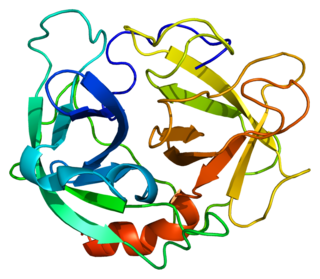
Neutrophil elastase is a serine proteinase in the same family as chymotrypsin and has broad substrate specificity. Neutrophil elastase is secreted by neutrophils during inflammation, and destroys bacteria and host tissue. It also localizes to neutrophil extracellular traps (NETs), via its high affinity for DNA, an unusual property for serine proteases.

Chemokine ligand 7 (CXCL7) is a human gene.

Beta-defensin 2 (BD-2) also known as skin-antimicrobial peptide 1 (SAP1) is a peptide that in humans is encoded by the DEFB4 gene.

Alpha defensins are a family of mammalian defensin peptides of the alpha subfamily. In mammals they are also known as cryptdins and are produced within the small bowel. Cryptdin is a portmanteau of crypt and defensin.

Beta defensins are a family of vertebrate defensins. The beta defensins are antimicrobial peptides implicated in the resistance of epithelial surfaces to microbial colonization.

Defensin, alpha 1 also known as human alpha defensin 1, human neutrophil peptide 1 (HNP-1) or neutrophil defensin 1 is a human protein that is encoded by the DEFA1 gene. Human alpha defensin 1 belongs to the alpha defensin family of antimicrobial peptides.

Beta-defensin 1 is a protein that in humans is encoded by the DEFB1 gene.
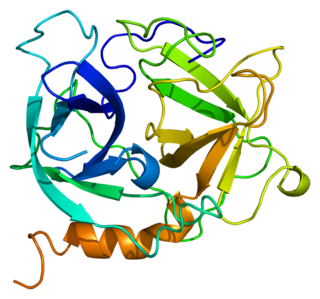
Azurocidin also known as cationic antimicrobial protein CAP37 or heparin-binding protein (HBP) is a protein that in humans is encoded by the AZU1 gene.

Beta-defensin 103 is a protein that in humans is encoded by the DEFB103A gene.

Leukocyte elastase inhibitor (LEI) also known as serpin B1 is a protein that in humans is encoded by the SERPINB1 gene. It is a member of the clade B serpins or ov-serpins founded by ovalbumin.
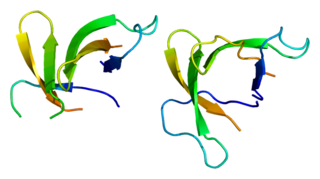
Defensin, alpha 5 (DEFA5) also known as human alpha defensin 5 (HD5) is a protein that in humans is encoded by the DEFA5 gene. DEFA5 is expressed in the Paneth cells of the ileum.

Sperm-associated antigen 11B is a protein that in humans is encoded by the SPAG11B gene.

Beta-defensin 104 is a protein that in humans is encoded by the DEFB104A gene.

Beta-defensin 106 is a protein that in humans is encoded by the DEFB106A gene.

Beta-defensin 127 is a protein that in humans is encoded by the DEFB127 gene.

Beta-defensin 105 is a protein that is encoded by the DEFB105A gene in humans.

Beta-defensin 129 is a protein that in humans is encoded by the DEFB129 gene.
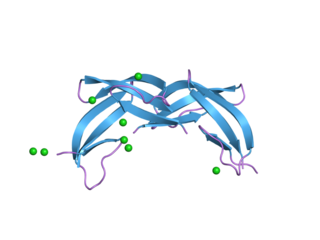
Defensin, alpha 6 (DEFA6) also known as human alpha defensin 6 (HD6) is a human protein that is encoded by the DEFA6 gene. DEFA6 is expressed in the Paneth cells of the ileum.
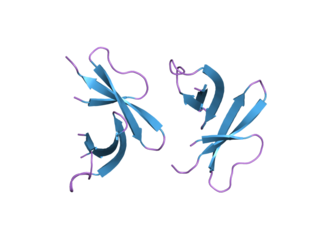
Defensin, alpha 4 (DEFA4), also known as neutrophil defensin 4 or HNP4, is a human defensin peptide that is encoded by the DEFA4 gene. HNP4 is expressed in the granules of the neutrophil where it defends the host against bacteria and viruses.

Defensin, alpha 1B a human protein that is encoded by the DEFA1B gene.
























